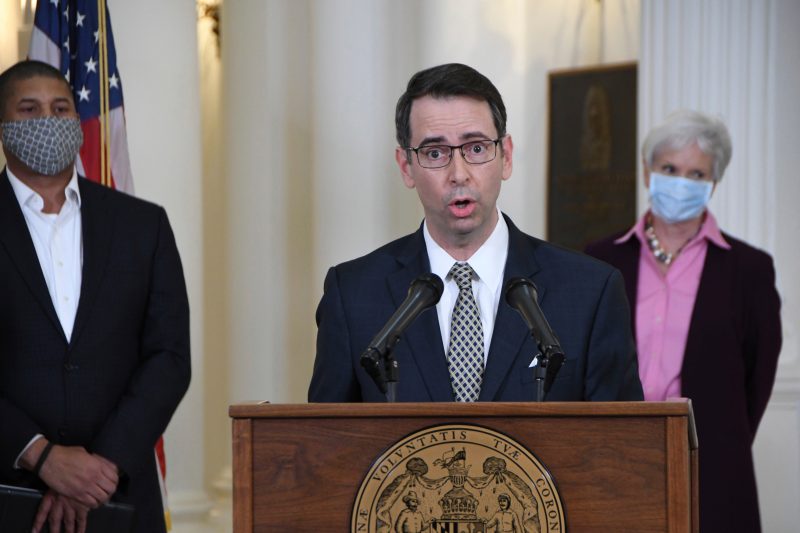Roy C. McGrath, a top aide to Larry Hogan when he was Maryland’s governor, is believed to have shot himself following a traffic stop in Tennessee, the fatal end to a 21-day manhunt that began when the fugitive did not show up for his federal trial, according to a law enforcement document.
The FBI also fired during the stop, the document said, and it is unclear whether the self-inflicted wound or shots from law enforcement killed McGrath, whom federal and state prosecutors accused of embezzling public funds and illegally recording phone calls with top Maryland officials.
McGrath, 53, a slim, graying man with a reputation in Annapolis as a strait-laced bureaucrat, had an 11-week tenure as Hogan’s chief of staff in 2020, the capstone to nearly eight years of working with Hogan and decades in his acquaintance.
Hogan and top aides were set to testify in a trial scheduled to begin March 13, but McGrath failed to show, setting in motion a manhunt that ended abruptly Monday evening along a road in the Knoxville area — roughly 800 miles from his Naples, Fla., home.
FBI officials declined to elaborate Tuesday on the events preceding McGrath’s death, or detail his whereabouts in the weeks between his last phone call with lawyer Joseph Murtha and his death. Former colleagues struggled to understand McGrath’s trajectory from a fastidious aide to fugitive with a $20,000 bounty on his head.
“Either he was absolutely not the person that I thought he was, or he somehow, like in the show ‘Breaking Bad,’ made one bad decision after another — about his severance that led to covering his tracks, that led to another bad decision, that led to another, that led to what happened in Tennessee yesterday,” said Adam Dubitsky, a former Hogan policy director who reported to McGrath when he was Hogan’s deputy chief of staff.
“Every single aspect of this came as a shock to me,” Dubitsky said, adding “the fact that he was a flight from justice, the fact he would die in a confrontation with law enforcement, none of this lines up with the person I thought I knew. And it’s just a great tragedy.”
McGrath resigned from public service amid legislative and media scrutiny of the $230,000 severance package he negotiated to leave a quasi-public agency, called the Maryland Environmental Service, to help run the government for Hogan during the pandemic.
As the scandal unfolded, Hogan (R) first called the legislative hearings a “witch hunt” in a message to McGrath, and publicly accepted the resignation with regret. But the episode eventually forced a break between the two men as Hogan learned more and McGrath insisted he had done nothing wrong and accused his former boss of betrayal.
Murtha called McGrath’s death “an absolute tragedy” and said his client maintained that he was innocent. William Brennan, an attorney for McGrath’s wife, Laura Bruner, did not respond to a request for comment Tuesday but the previous evening said McGrath’s widow was “absolutely distraught.”
In a statement Monday night, the FBI said it was “reviewing an agent-involved shooting” that happened around 6:30 p.m. Officials said that, during his arrest, McGrath sustained injury and was taken to the hospital. The statement went on, “the FBI takes all shooting incidents involving our agents or task force members seriously.”
Len Foxwell, a longtime Democratic consultant in Annapolis, got to know McGrath in 2015 when the two were involved with the Maryland Board of Public Works — McGrath as a liaison to Hogan and Foxwell as a liaison to Comptroller Peter Franchot (D). That three-member board handles most large state spending contracts, Foxwell said. McGrath seemed an excellent fit.
“He struck me as an exceedingly meticulous and honest public servant,” Foxwell recalled. “He was highly attentive to detail. He spoke with precise diction. He had an immaculate manner of dress.”
As McGrath’s career progressed, Foxwell noted, so too did his responsibilities.
“I’m always going to believe that Roy at his core was a decent person who was given more power and influence than he was ready to receive,” Foxwell said. “It seems to me it got to his head, and he got in over his head. I am deeply sad, and I am quite frankly at a loss as to how it got this far.”
What to know about Roy McGrath
1/3
End of carousel
Foxwell noted that McGrath had been publicly disgraced and was looking at possible prison time, and that it was impossible to know from the outside his emotional state of mind.
“A lot of us knew pieces of Roy, but I don’t if anyone knew the whole picture,” Foxwell said. “It’s a terribly sad and pointless death.”
McGrath also was charged with theft, misconduct in office and violating Maryland’s wiretap laws by recording private calls with Hogan and other officials without their permission. A state trial was scheduled for this summer.
Steve Crim, a former 2014 campaign manager and senior adviser to Hogan, said he saw McGrath as “an honest, loyal follower.” Crim recalled speaking to McGrath in the summer of 2020 when news first broke about the severance package. “He thought it was a bump, something he’d survive, and he’d continue to serve,” Crim said.
Born in Greece, McGrath grew up in Maryland and became involved in politics at 18, when he became a member of the Republican Party and later formed a Young Republicans club in Southern Maryland. McGrath knew Hogan as a congressional candidate in the early 1990s and served on his campaign committee during Hogan’s unsuccessful bid to unseat Rep. Steny H. Hoyer (D-Md.). At the time, McGrath was leading the Charles County Republican Central Committee.
The two met again in 2014, when McGrath, who was then working as vice president of business development and conventions at the National Association of Chain Drug Stores, volunteered and donated to Hogan’s gubernatorial campaign. Shortly after Hogan won, he tapped McGrath as his deputy chief of staff.
In 2016, Hogan appointed McGrath to take over running Maryland Environmental Service. In 2020, the governor asked McGrath, whom he called a “leader with a proven track record … and a passionate commitment to public service,” to take one of the most powerful positions in state government, as his chief of staff.
Former colleagues in the State House said McGrath was a consummate administrator and known for being meticulous, the type of person who always played it by the book. They described him as being a straightforward, formal and, at times, stiff colleague who focused on work and did not seem to have outsize political ambitions.
While under investigation, McGrath moved to Florida and bought a house in a gated community with his then-girlfriend. Federal agents executed a search warrant on the home on March 15.
McGrath’s longest-held job in Hogan’s orbit was four years as executive director of the Maryland Environmental Service, which helps local governments finance public works projects such as wastewater treatment plants.
While there, McGrath had also been reimbursed for a series of expenses uncommon in the public sector — international trips and tuition at Harvard, for example. The quasi-public agency, which is run like a private nonprofit, has a board that approved McGrath’s controversial severance, though some board members later said they did so because they believed the governor had supported it. Hogan has said he did not.
After he resigned, McGrath began writing a book about his experiences and shared a few draft pages with The Washington Post. After his disappearance, the first two installments of what was purported to be McGrath’s three-part authorized biography were self-published on Amazon. The listed author, Ryan Cooper, did not provide enough information for The Post to confirm his identity.
On Tuesday, Cooper did not respond to requests for comment.
Dana Hedgpeth contributed to this report.








